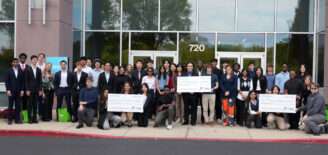Is Ruby on Rails ready for retirement or reset for growth?
What powers the products of Indiana tech startups? From a developer’s perspective, it’s the coding language. The languages and frameworks set the foundation for a product’s present and future—frameworks like Ruby on Rails.
For many in our tech ecosystem, Ruby on Rails has been a popular choice when building companies’ applications: its ease of use and faster development times have been deployed by plenty of Indiana startups, including some that have scaled and exited successfully. But, over the years, competitors have emerged and opportunities for formal training have been closed. Where does that leave Ruby on Rails in Indiana?
Developers find happiness with Ruby on Rails
Ruby on Rails is a combination of the programming language Ruby with a web application development framework called Rails. Together, Ruby on Rails (or “Rails”) operates as a commonly-used tool to quickly build and deploy web-based applications. It’s found a strong niche within tech startups worldwide for its ease of use and faster development times, favoring convention over configuration and developer happiness. “If you follow the conventions that Rails establishes, it’s astonishing how quickly you can develop applications,” said Davey Strus, partner at Fretless and former Ruby and JavaScript instructor at Eleven Fifty Academy. “That hasn’t changed in the intervening 15 years.”
Within the Indiana tech scene, people we spoke with started using Rails between 2004 and 2006. When it debuted, the faster development speeds that Rails promised caught the attention of many startups. “Ruby on Rails was blowing up in popularity, and so were web startups locally,” said Miles Sterrett, partner at Fretless. “You had an ecosystem that grew to support that.”
Sterrett noted several startups that scaled using Rails before eventually being acquired: iGoDigital (bought by Salesforce), Octiv (bought by Conga) and MOBI (bought by Tangoe) all used Rails. “All were forces to be reckoned with in their fields because of their quickness to market and the speed with which they were able to add features and change direction, which I believe was in some part due to Ruby and Ruby on Rails,” he said.
Despite its successes, some believed that Rails was doomed. When it premiered, Rails was popularized in part because most other languages and applications couldn’t do what Rails did. Over time, however, others became competitive in the areas in which Rails was built to excel while offsetting some of Rails’s technical drawbacks. When national coding academy Coding Dojo announced it was dropping its Rails program in July 2017, some in the national tech scene saw it as a sign that Rails was on its way out, sidelined in the face of growing competition from seemingly more effective applications. When the Indy chapter of coding bootcamp The Iron Yard closed about the same time, ending the last coding academy-style program for Rails, it seemed Indiana would follow suit.
And yet, Rails and its underlying language continue to be consistently ranked as a top 10 platform and keep appearing in large-scale surveys of developers as required. “It’s not that Ruby is dying, it’s that we’ve matured,” said Sterrett. “It’s no longer a sexy, exciting, moving-fast-and-breaking-things language. But it’s a mature, stable language and framework that’s just getting better more incrementally rather than by leaps and bounds.”
Chris Vannoy, director of engineering at Sigstr and former Ruby instructor at The Iron Yard, noted that while there are technical drawbacks to Rails depending on how it’s deployed, potential remains. “If you’re creating a fairly standard web application, I still maintain that Rails is your fastest point A to point B, because it does so much for you,” he said. “As long as you stick to the golden path of what Rails is built for, which is essentially that type of application, you can move very fast.”
The next generation of Ruby on Rails talent
Indiana’s job market for Rails talent still looks strong. Surveying TechPoint’s Job Board, companies seeking Rails talent cover the spread, from new startups to large enterprises. Employment data aggregator ZipRecruiter also concluded the Indianapolis market is currently “very active” in hiring Rails developers. Although other languages and applications like JavaScript, Node.js and Python are appearing more often in job descriptions, it’s reflective of the need for programmers to know more languages—to be “polyglots.” Knowing the Ruby language and Rails framework still matters.
But without bootcamps like The Iron Yard, how do we skill up people in Rails? For Strus, it’s a return to earlier days. “It was only during a relatively brief period that formal training was available in Indy, and although the demand for Ruby on Rails developers always seemed to exceed the supply, we managed,” he said. “Developers familiar with another language or framework can learn Ruby on Rails on the job.”
Vannoy noted that junior-level talent, aided by the simplicity of learning Ruby, are mastering Rails without coding bootcamps, and businesses need to plan ahead to train and retain them as they gain experience. “You need to have mentorship programs in place, and you need to be able to support the continued learning of those junior developers and also be prepared for the fact they’re going to get better, and then they’re probably going to leave,” Vannoy said. “That’s how this business works.”
He also sees the small pool of senior-level talent as an unaddressed gap throughout the time he’s worked with Rails. Experienced Rails developers oftentimes are attracted to larger companies reliant on the framework, concentrating available talent into select companies and requiring startups to get creative in their hiring without the benefits of large salaries or perks.
“What startups can do is provide a different sort of culture that might align better to your values, or even just the speed and pace of work, and the ability to work on something and have more influence on the outcome,” Vannoy said.
Sterrett sees Ruby’s future to be much like its past: self-taught, or learned in small, mentored groups like the Indianapolis Ruby Brigade, a meetup Sterrett runs that connects Ruby programmers of all skill levels. “What I tell people frequently—and I think that you would hear this from a lot of Ruby engineers—if you have proven you know almost any programming language, I can teach you Ruby because of its philosophy on developer happiness,” he said. “It’s a very easy programming language to understand relative to other programming languages.”
Strus is also bullish on where both Ruby and Rails will go. “I think it has a great future. RubyConf sold out this year, and there’s a huge push to increase the performance of Ruby itself. That’s starting to pay off. Rails 6 is due this spring, and it’s exciting.”
What do you think about the future of Ruby on Rails in Indiana? Share your thoughts with us on LinkedIn, Twitter and Facebook.




